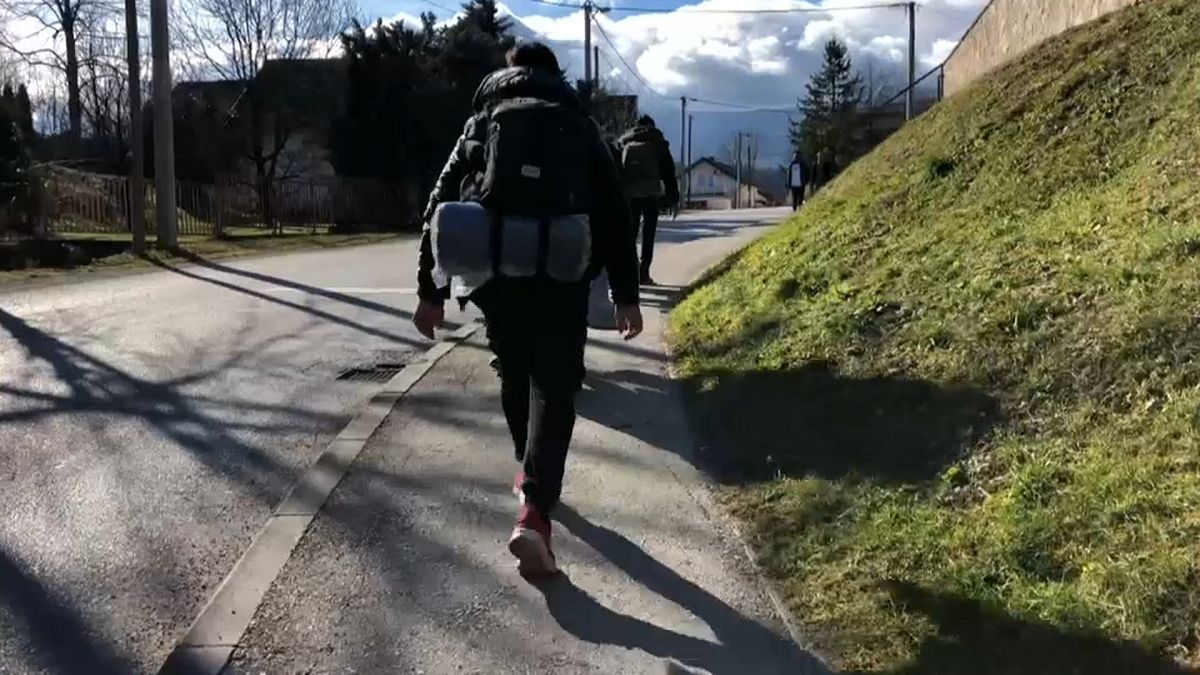Migrants attempting to reach the European Union through Bosnia and Herzegovina have a dangerous journey ahead of them.
Bosnia and Herzegovina has seen a sharp increase in migrant arrivals: 30,000 entered its territory last year compared with 750 in 2017, according to the UN Refugee Agency.
As other routes into the European Union have closed, some migrants have tried to make it into the bloc via a dangerous route through mountains and forest into Croatia.
Most of the migrants travelling through the Balkans in recent years have come from Afghanistan, Pakistan and Iran.
An estimated 7,000 asylum seekers, refugees and other migrants remain in Bosnia.
Many say those trying to reach the bloc have been violently pushed back from the border by the Croatian police.
Croatia and the EU's free movement zone
Some say the overwhelming evidence of violence at the Bosnian-Croatian border should have an impact on Croatia's bid to join the Schengen, the EU's free movement zone.
Dutch MEP Tineke Strik told Euronews that she recently travelled to the border between Bosnia and Croatia.
"People reported being beaten up by the Croatian police, being forcibly taken back to Bosnia and Herzegovina and given no information or denied access to the asylum system," Strik, a former professor of migration law, said in a statement, quoting multiple human rights reports.
"There is a lot of violence and the government (in Croatia) doesn't investigate complaints in those reports and they also do not have any monitoring on the ground," she told Euronews.
The European Commission says the bloc's newest member has met the "necessary conditions to join the Schengen area".
But once Croatia joins Schengen, Strik says, the Commission "won't have any influence in the Croatian government".
Amnesty International's Massimo Moratti said Croatia should be "reminded of its obligations under international human rights law as well as EU law".
"The accession to Schengen should generate the momentum to put an end to illegal pushbacks and to violence at the border between Bosnia and Croatia," Moratti told Euronews.
Even though they have met the conditions of Schengen, "Croatia will need to continue working on the implementation of all ongoing actions, in particular its management of the external borders," a Commission spokesperson told Euronews.
Meanwhile, authorities in Croatia continue to deny the multiple eyewitness accounts, testimony and photo evidence of violence at the border.
"There are many of these civil society campaigns that are trying to prove that this is the case, but I am also suspicious," said Croatian MEP Željana Zovko.
Croatia's ministry of interior said in an emailed statement to Euronews that irregular migration presented a "security risk" but that "no evidence was found which would suggest the use of coercion on migrants".
They added that those trying to reach Croatia had made "false statements against police officers who deter them from their aim on a daily basis".
Border control on European Union's doorstep
Croatian police often work with Bosnian authorities to manage the border.
Bosnia's security minister Fahrudin Radončić told Euronews: "the EU has to understand in order to protect their own security they need to turn Bosnia, Serbia, Montenegro and the whole region into an impenetrable barrier for migrants."
But Strik says that the focus on external border control means that member states "tend to look away and deny this is taking place."
"We really lack a sufficient system of reception and protection and we really lack responsibility-sharing," she added.
Just last week, the European Court of Human Rights ruled that migrants and refugees arriving in the bloc "irregularly" may legally be expelled. The case brought before the court involved Spain sending back migrants to Morocco.
Human rights group Amnesty International tweeted that it a "very disappointing judgement".
But, it might not apply to Croatia, Moratti says, which unlike Spain has not set up specific entry points that regularly receive asylum applications.
"Persons who have entered Croatia irregularly and claimed for asylum were often told 'there is no asylum in Croatia' and then pushed back, even if they were in police stations," Moratti said.
"Violence in these situations is, in any case, unacceptable and it is not justified by the circumstances."
Watch Euronews' Anelise Borges report on the situation in Bosnia & Herzegovina in the video player above.
